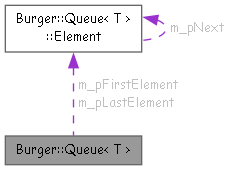A simple first in first out queue. More...

Classes | |
| struct | Element |
| A single data chunk in the queue. More... | |
Public Member Functions | |
| Queue () | |
| Initialize to defaults. | |
| ~Queue () | |
| Dispose of all data remaining in the Queue. | |
| void | clear (void) |
| Dispose of all data in the Queue. | |
| const T & | back (void) const |
| Get a reference to the last element in the list. | |
| T & | back (void) |
| Get a reference to the last element in the list. | |
| const T & | front (void) const |
| Get a reference to the first element in the list. | |
| T & | front (void) |
| Get a reference to the first element in the list. | |
| void | pop (void) |
| Remove the first element in the list. | |
| void | push (const T &rData) |
| Insert data at the end of the list. | |
| uintptr_t | size (void) const |
| Get the number of entries in the queue. | |
| uint_t | empty (void) const |
| Returns TRUE if the queue is empty. | |
Private Attributes | |
| Element * | m_pFirstElement |
| Pointer to the first element in the linked list. | |
| Element * | m_pLastElement |
| Pointer to the last element in the linked list. | |
| uintptr_t | m_uCount |
| Number of entries in the linked list. | |
A simple first in first out queue.
This class will put data into a singly linked list and insert at the end and extract from the beginning.
|
inline |
|
inline |
Get a reference to the last element in the list.
This will return a reference to the last entry in the list.
Get a reference to the last element in the list.
This will return a reference to the last entry in the list.
Dispose of all data in the Queue.
Frees all data and clears out the queue. The queue is still valid, only empty.
Returns TRUE if the queue is empty.
Get a reference to the first element in the list.
This will return a reference to the first entry in the list.
Get a reference to the first element in the list.
This will return a reference to the first entry in the list.
Remove the first element in the list.
This will dispose of the first entry in the list.
Insert data at the end of the list.
Allocate memory for a new entry and place it at the end of linked list.
| rData | Reference to a data chunk to copy into the queue |
Get the number of entries in the queue.
|
private |
Pointer to the first element in the linked list.
|
private |
Pointer to the last element in the linked list.
|
private |
Number of entries in the linked list.